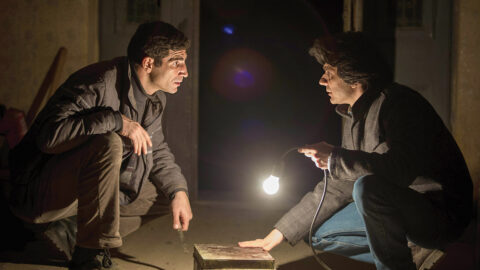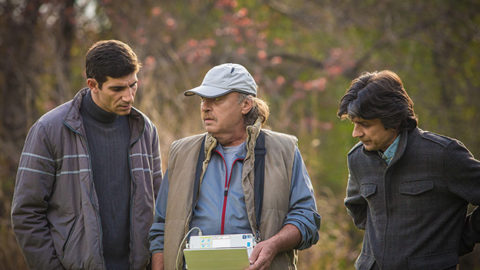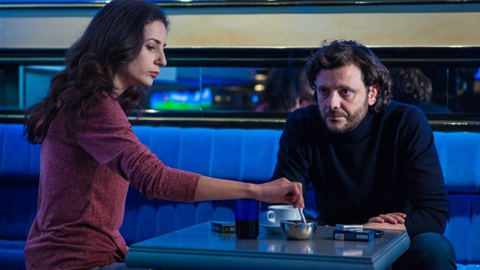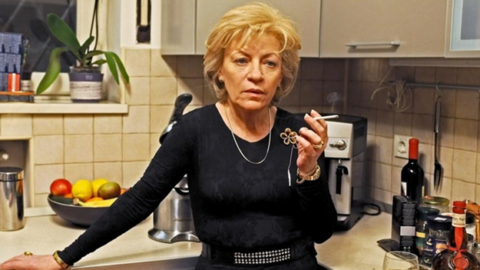Film of the Week: The Treasure
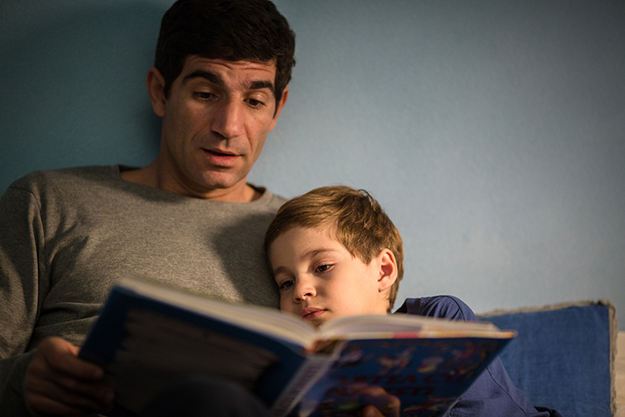
The time-honored trope of the treasure hunt never seems to get stale, although a central aspect of it may not be exactly translatable into every language—the idea of digging one hole in order to dig yourself out of another one. The theme receives distinctively sardonic treatment in The Treasure, a concise parable from Romanian director Corneliu Porumboiu. For a long stretch, there doesn’t seem to be a great deal going on in The Treasure—something that was true of his earlier slow-burners Police, Adjective (09) and the somewhat claustrophobic meta-cinematic contemplation When Evening Falls on Bucharest or Metabolism (13). But plenty is alluded to—and throughout The Treasure, the metaphor of what’s hidden under the surface of things, and notably under the surface of Romanian society and history, is never far from the viewer’s mind.
Minimalism of the sort that Porumboiu specializes in is an extremely hard register to maintain, and in this film, it involves the viewer walking a tightrope as much as the director does. Porumboiu requires us constantly to keep our options open, to refrain from making our minds up about whether we’re watching a drama, a supremely low-key comedy, or something that might at some point turn recognizably into a thriller, conceivably of the House of Games double-bluff variety. But the cultivated simplicity of the film’s shooting style suggests, like When Evening Falls—also shot by Tudor Mircea—a kind of mathematical process, not so much a story as a demonstration, a case that we’re given to observe and then to draw conclusions from.
The story of The Treasure looks at first glance like one of startling mundanity. A youngish man, Costi (Toma Cuzin), is at home one evening, reading his young son the story of Robin Hood, when the doorbell rings. It’s his neighbor, Adrian, played by Adrian Purcarescu—in real life a film director whose own investigations of a family property put Porumboiu onto the path of this story.
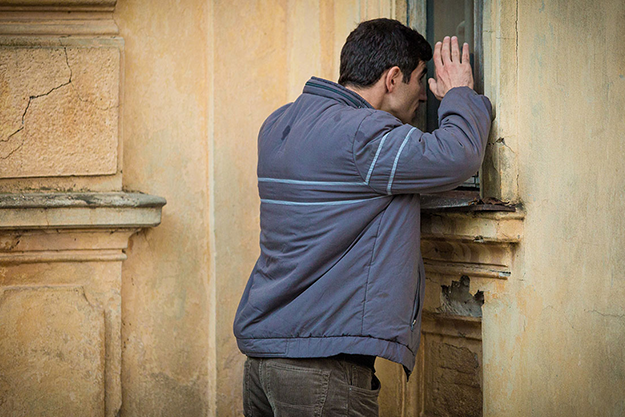
Costi doesn’t appear to know him very well, but Adrian, perhaps presumptuously, thinks he’s close enough to Costi to ask whether he can spare 800 euros. It seems that Adrian, a failing small-time publisher, has borrowed 76,000 euros, at a 13-percent interest rate. Costi regretfully tells him he’s unable to help, leaving us to wonder just how 800 euros is supposed to get anyone out of such deep trouble.
Shortly after, Adrian comes back with the full story: it turns out that 800 euros is the rental cost of a metal detector, for he has a treasure hunt in mind. Legend has it that a fabulous hoard is buried in his old family house in the country, an estate confiscated years ago when the Communists took power in Romania, and which has recently come back into Adrian’s possession. His grandfather told Adrian with his dying breath to look after the house—which must surely have meant he intended him to dig for the family fortune.
It’s a great story, if a preposterous one—so who’s the credulous one here? Is Adrian blindly committed to a fool’s mission, or is it the placid, lumbering Costi who’s going to get duped? It rather looks as though he is, for Costi is the type who seems fated to get himself into ever deeper trouble just because he can. After sneaking out of work to consult a man about hiring a metal detector—for he’s immediately sold on Adrian’s project—Costi is asked by his boss where he has been. Having initially fibbed to cover his tracks, he tells the truth, but his boss doesn’t believe him; he’s convinced that Costi has been covering up an affair with a co-worker. And to get himself out of that embarrassing misunderstanding, Costi makes up another fib and tells his boss that he is having an affair—but with a woman from the metal detector rental company.
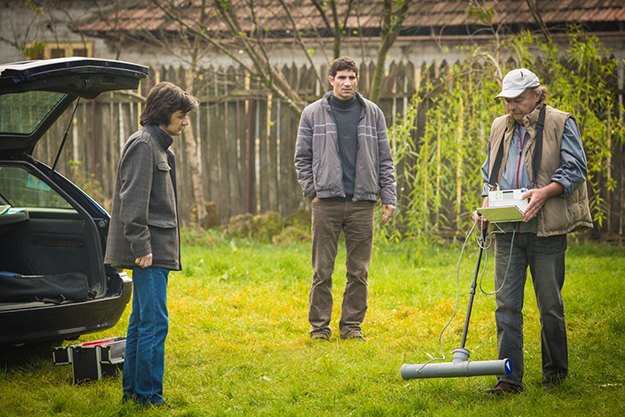
So by the time Costi and Adrian arrive at the old family estate, the ground soil of certainties and appearances is already thoroughly messed up. Enter Cornel, the man whose job it is to operate the metal detector, and who brings along some apparently sophisticated computer imaging equipment that no one quite seems to know how to use. Cornel is in fact played by non-professional Corneliu Cozmei, whose job in real life is to operate metal detectors. One wishes him good luck: his laid-back testiness as an actor could well secure him more screen work, but I doubt he’s doing himself much of a favor in his usual profession by advertising himself as quite such an affably shambling figure.
The main action of the film sees the three men trying to find a good spot to dig in the garden of the family house—a space that has been in its time the location of a brickworks, a steelworks, a kindergarten, and a strip club, while also occupying the historic location where the Wallachian Revolution of 1848 was launched with a famous proclamation. If they find the right spot, it seems, our heroes will get to dig deep through the layers of modern Romanian history itself; in the meantime, they’ll have to watch Cornel pacing ruminatively up and down, as his detector emits a comically neurotic keening sound.
There are tensions and delicate turns throughout this sequence that keep us guessing about where events are going. Not least is the transformation in Adrian himself, who has exchanged his initial modest pleading for a tone of impatient bossiness—it is his estate, after all—as he lays down the law to both Costi and Cornel. As for the placid, dogged Costi, who eventually disappears down the hole, his presence only signaled by his spade intermittently bobbing up to scatter earth, he seems more committed to this fool’s errand than anyone else. Meanwhile, Porumboiu plants suggestions that we’re eventually—but give it time—going to see another film entirely. Cornel’s announcement that the house is full of ferocious crows suggests that The Treasure might make up its mind to go full Gothic on us. And the very sight of a well-meaning but clueless working stiff like Costi disappearing down a deep pit promises a black comic touch of Fargo, at the very least.
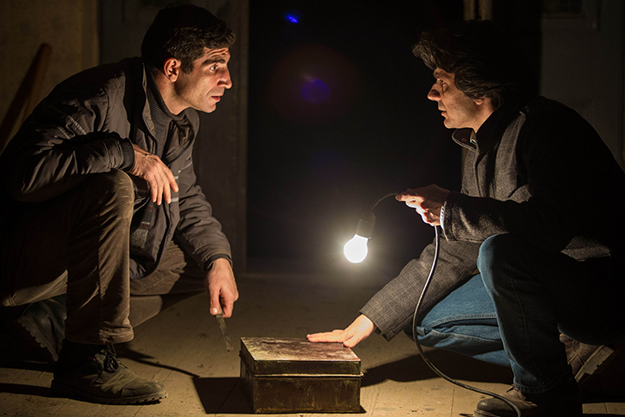
What we, and the treasure seekers, eventually get comes as a surprise. Suffice to say, there’s the discreetest touch of Hitchcockian suspense involved. Just before the film makes its first decisive reveal, Porumboiu cuts away to the sight of a ladder being pulled up out of the ground, keeping us waiting just a fraction—but enough to set our teeth grinding in frustration. The film, in fact, uses a number of such “flat” cutaways—close-ups of Cornel’s computer screen, or of a Robin Hood illustration in Costi’s son’s storybook, resembling a mediaeval tapestry. It all contributes to a visual keynote of diagrammatic flatness, in keeping with the heightened artifice of certain two-shots, like the early one in which Costi and his son might as well be stick figures in a storyboard.
This visual scheme, and accompanying tone of narrative simplicity, are exploded at the very end of the film—which also throws us a soundtrack curveball that’s as mystifying as it’s amusing. After the denouement’s first unexpected left turn, Porumboiu slowly unwraps a series of “what the…?” tweaks until the final scene leaves us looking back in bewilderment (and delight, or frustration, depending on how you feel about this kind of ending) wondering how we ever got to this point. Some may regard The Treasure as representing a very minor kind of cinema, as being little more than the Balkan equivalent of an O. Henry or Guy de Maupassant short story extended beyond its natural duration. It’s certainly not the kind of demonstratively Zeitgeist-catching film that distributors are hoping will come along to rescue the flagging foreign-language market. You may feel like Costi’s young son, who thinks that if it doesn’t glitter, it ain’t gold—“Where are the rubies?” exclaims this storybook-schooled kid who has his own idea of what treasure is. But the ending, which may be a picture of desolation and folly, or of joyous contempt for acquisitiveness, puts its own delicate sheen on this small but keen gem.
Jonathan Romney is a contributing editor to FILM COMMENT and writes its Film of the Week column. He is a member of the London Film Critics Circle.



